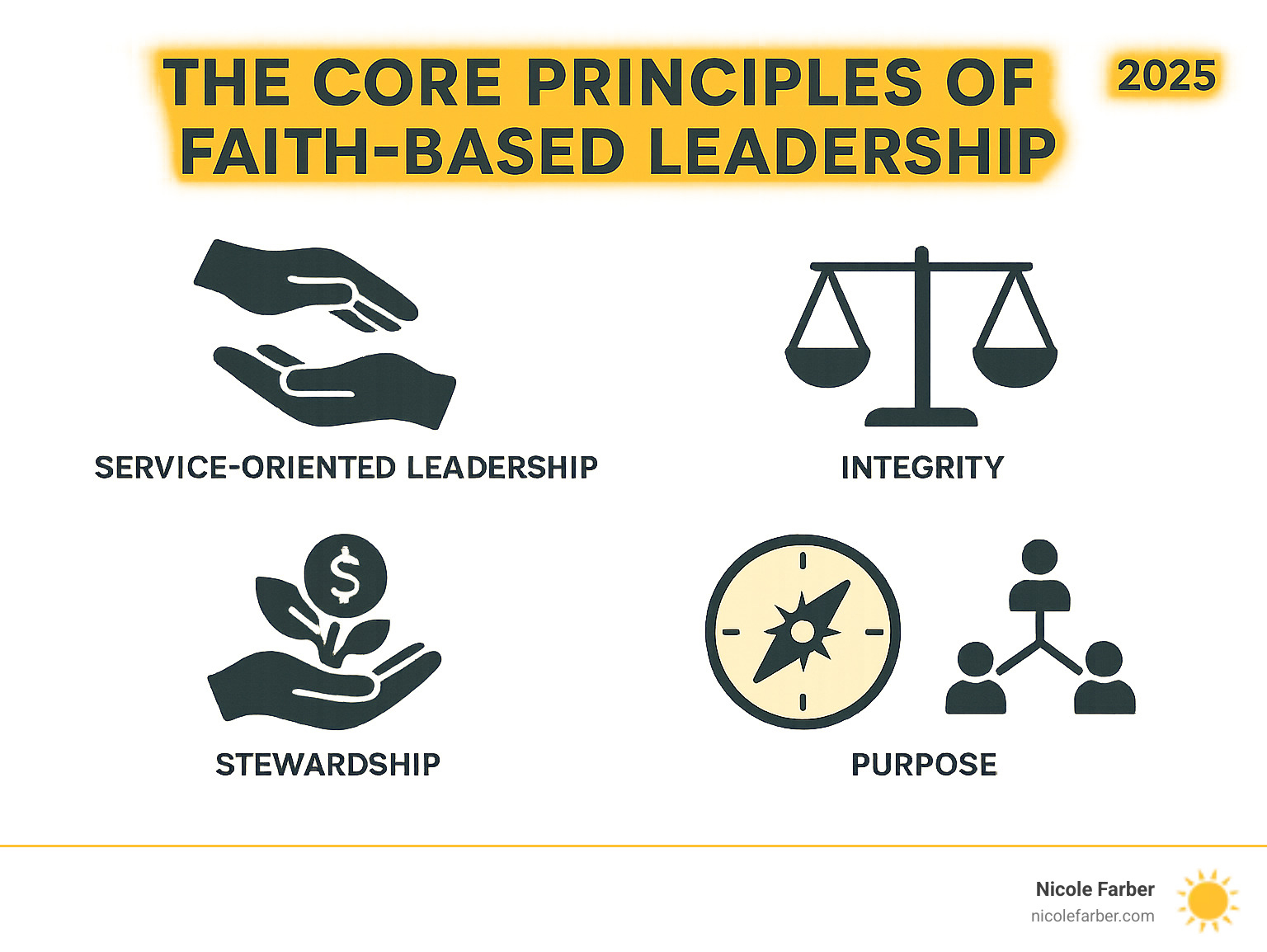Beyond the Bottom Line: Integrating Faith into Business Leadership
- Faith
- In the News
- September 22, 2025
Does Faith Have a Place in the Boardroom?
Faith based business leadership is a growing movement where leaders integrate spiritual values into their professional lives. While the separation of church and state is a core principle, the role of faith in business remains a topic of great interest and debate among entrepreneurs and executives.
Key Elements of Faith-Based Business Leadership:
- Servant Leadership – Prioritizing the needs of others
- Ethical Decision-Making – Using moral principles as a guide
- Stewardship – Viewing resources as entrusted assets
- Purpose-Driven Operations – Seeking impact beyond profit
- Community Impact – Using business success to benefit society
Many executives grapple with isolation and ethical dilemmas. Faith-based leaders often find that their spiritual principles provide a compass for navigating these challenges.
The results are compelling: companies with honest leadership report a 42% increase in productivity and significantly lower employee turnover. This shows that integrating ethical, faith-based principles isn’t just morally sound—it’s good for business.
From major retailers like Walmart and Chick-fil-A to local firms in Philadelphia and Wilkes-Barre, faith-driven leaders are proving that businesses can thrive while maintaining higher ethical standards. They often view their companies as platforms for positive impact, not just profit-generating machines.
As Nicole Farber, I’ve spent over 15 years helping business owners steer growth and leadership challenges, including those seeking to integrate faith based business leadership principles. Through my work with law firms and businesses, I’ve seen how leaders who operate from a foundation of faith create more resilient, purpose-driven organizations.

The Core Principles of Faith-Based Leadership
Entrepreneurs from Philadelphia to New Orleans often ask me: How do you stay true to your values while building a successful business? The answer lies in elevating your business goals through principles that create lasting impact. These are practical guidelines that shape every decision.

At the heart of this approach is servant leadership. When you focus on serving your team first, employees become more engaged, customers feel cared for, and your business grows. Instead of asking “What can my team do for me?” ask “What can I do to help my team succeed?” This shift changes everything.
Integrity and honesty are foundational. The temptation to cut corners can be strong, but every small compromise erodes trust. The businesses I’ve seen thrive long-term are those that choose transparency, even when it’s uncomfortable.
Stewardship over ownership transforms how you view your business. Instead of thinking “This is mine,” ask “How can I best manage what’s been entrusted to me?” This affects how you treat people and handle company resources.
Humility in leadership means being secure enough to admit mistakes and celebrate others’ successes. The most powerful leaders I know in places like Luzerne County are also the most humble. They understand that true strength comes from lifting others up.
Finally, diligence and excellence call us to bring our best effort to our work, not to impress others, but because quality reflects our values. Whether you’re running a law firm in Wilkes-Barre or a startup in Philadelphia, this commitment sets you apart.
These principles create businesses that thrive while making a positive impact. To learn more, see my guide on How to Become an Effective Leader.
Key Characteristics of an Effective Faith-Based Leader
What does faith based business leadership look like in practice? I’ve noticed some common characteristics that set these leaders apart.
- A service-oriented mindset shows up in daily choices, like a manager staying late to help a struggling team member. It’s about genuinely caring for the people you lead.
- Compassion and empathy are game-changers. When employees know you see them as whole people, they’ll move mountains for you. Leading with your heart and head transforms businesses.
- Vision and inspiration come naturally when your purpose extends beyond profit. Faith-based leaders paint a picture of the future that gets everyone excited to be part of something bigger.
- Accountability to a higher purpose brings a moral clarity that guides tough decisions. This internal compass helps you Walk by Faith Not by Sight, especially when the path is unclear.
These characteristics are practical tools for navigating modern business while staying true to your values.
How Faith Shapes a Leader’s Personal and Professional Growth
Your faith isn’t separate from your professional development—it’s the foundation. Faith provides an incredible foundation for resilience during tough times, helping you get back up when logic says to quit.
When ethical dilemmas arise, faith serves as your guide for ethical decision-making. Clear principles give you the courage to make the right choice, even when it’s costly. Most importantly, faith provides a profound source of purpose. Viewing your work as a calling to serve others changes everything—your energy, your creativity, and your team’s morale.
Faith also encourages continuous learning and self-reflection, pushing you to examine your actions and impact. This self-assessment is crucial for growth. Sometimes this journey requires extra support, which is why I offer Christian Life Coaching for leaders who want to integrate their faith more fully into their professional lives.
From Belief to Boardroom: A Practical Guide to Faith-Based Business Leadership
Understanding the principles of faith based business leadership is one thing; integrating them into daily operations is another. This is where belief becomes action, shaping everything from hiring to marketing.

True integration means faith is woven into the fabric of the organization. This commitment to ethical standards is a strategic advantage. As statistics show, companies with honest leadership report a 42% increase in productivity and lower employee turnover. This is the fruit of a culture built on trust.
A faith-based decision-making framework involves asking questions that go beyond immediate profit, considering the impact on all stakeholders. This holistic view ensures choices align with core values, fostering long-term success. For more insights into this integration, explore Faith-Based Leadership in Business.
How to Integrate Beliefs into Daily Operations
Integrating faith into daily operations requires intentionality. Here are key areas to focus on:
- Ethical HR policies: Establish fair employment practices for hiring, promotion, and compensation. Foster an inclusive environment where every employee is treated with dignity. In diverse cities like Philadelphia and New Orleans, this commitment to fairness is vital.
- Transparent communications: Be honest in all dealings with customers, suppliers, and employees. Truthful marketing builds trust and a reputation for integrity.
- Fair trade and ethical sourcing: Partner with suppliers who adhere to fair labor practices and respect environmental sustainability. Extend your ethical commitment throughout your entire business ecosystem.
- A culture of compassion: Support work-life balance, provide mental health resources, and encourage managers to lead with understanding. Create a caring work environment.
- Faith-based practices: Optional practices like a moment of reflection before meetings or offering devotional resources can reinforce core values and provide spiritual nourishment. For more practical strategies, consider our Business Leadership Strategies.
For those looking to deepen their understanding, we recommend these books:
- Faith and the Marketplace by Bill Winston
- The Self-Aware Leader by John C. Maxwell
- How to Lead When You’re Not in Charge by Clay Scroggins
- Every Good Endeavor by Timothy Keller
- Lead With Prayer by Ryan Skoog
- Women Evolve by Sarah Jakes Roberts
- God And Money by John Cortines and Gregory Baumer
- Marketing Like Jesus by Darren Shearer
- Faith Driven Entrepreneur by Henry Kaestner, J.D. Greear, and Chip Ingram
- Guarding the American Dream by Lisa Bray
Balancing the Scales: Profit, Purpose, and People
Balancing financial success with a higher purpose is a delicate art. Stewardship of financial resources is key. View wealth as a tool to advance God’s purposes by making strategic investments and using resources to bless employees and the community. It’s about “profit with a purpose.”
Investing in employee well-being goes beyond fair wages. It includes fostering a supportive environment, investing in development, and recognizing employees as valuable individuals. Companies that prioritize worker welfare see higher engagement and lower turnover.
At its core, this balance means creating value for all stakeholders—not just customers or shareholders, but also employees, suppliers, and communities. A guiding principle is the “Golden Rule”: treat others as you wish to be treated. J.C. Penney, whose father was a Baptist minister, famously built his business on this principle, even calling his early stores “The Golden Rule Store.” This philosophy fosters trust and contributes to long-term success.
We strive to build businesses that are financially robust, ethically driven, and deeply human. For more insights into this delicate balance, explore Building a Successful Business.
Navigating the Crossroads: Challenges and Controversies
While inspiring, the path of faith based business leadership involves navigating complex challenges and controversies, requiring courage and resilience.
One of the most pressing challenges is the loneliness of leadership. As a single mother and business leader, I know the isolation that comes with carrying the weight of difficult decisions, especially when integrating faith into a secular marketplace.
Today’s complexity and information saturation can make it difficult to discern what truly matters. A strong spiritual compass is essential to cut through the noise and focus on what aligns with your values.
Navigating public controversy is another reality. When religious beliefs intersect with changing societal norms, leaders must be prepared for pushback. I’ve seen business owners from Philadelphia to New Orleans struggle with how to maintain their convictions while serving diverse communities.
The good news is you don’t have to face these challenges alone. Peer support groups and mentorship communities provide a safe space to share struggles and seek advice. Finding a community of like-minded leaders, whether in Wilkes-Barre or elsewhere, can make all the difference. Leaders in places like Luzerne County have shown that staying true to your values, even when difficult, leads to stronger, more resilient organizations.
Common Struggles in Faith-Based Business Leadership and How to Address Them
Here are common struggles I’ve witnessed among Christian business leaders and how to address them.
- Isolation: The corner office can be lonely. The solution is seeking out dedicated communities for Christian business leaders. These groups provide confidential spaces for sharing struggles and gaining wisdom from others on the same journey.
- Decision fatigue: The constant stream of data and pressure to make complex decisions is exhausting. The answer isn’t more information, but a framework for filtering it through biblical principles and seeking divine guidance. Trusted mentors can also offer valuable perspective.
- Maintaining witness under pressure: It’s tough to uphold Christian values in competitive environments. Regular self-inventory is crucial. Examine your habits, relationships, and priorities to ensure you stay aligned with your faith. Accountability from mature Christian mentors helps maintain your witness.
Finding community and mentorship in places like Luzerne County can be challenging, but it’s essential. Whether through local groups, online communities, or working with a Faith-Based Life Coach, support makes the journey of faith based business leadership more manageable and meaningful.
Purpose Beyond Profit: Philanthropy and Community Impact
A beautiful expression of faith based business leadership is how leaders use their success to serve others. For many, business is a platform for ministry and making a difference, not just building wealth.

This commitment to corporate social responsibility flows from core values like stewardship, compassion, and service. When you believe you’re managing entrusted resources, giving back becomes part of your company’s DNA.
I’ve seen this with business owners who view their companies as vehicles for positive change. They understand that success comes with a responsibility to employees, communities, and society.
Consider the powerful examples from history. The Walton Family Foundation distributed over $749.5 million in grants in 2020. Dolly Parton’s Imagination Library has gifted millions of books to children. The Dave Thomas Foundation for Adoption, shaped by its founder’s Christian faith, helps find homes for children in foster care.
These leaders prove that business as ministry works. Their influence inspires other entrepreneurs to think bigger about their purpose. From supporting local initiatives in Wilkes-Barre and Luzerne County to reaching communities in Antigua Guatemala, faith-driven businesses are making a global impact.
How Faith-Based Leaders Approach Philanthropy
Faith-based leaders approach giving in a way that is both personal and strategic, aiming to create lasting change.
- Establish foundations: Many leaders create foundations to ensure their philanthropic vision outlives them, creating generational impact.
- Support local causes: Meaningful philanthropy often happens locally. Faith-based businesses can be catalysts for change by sponsoring youth programs, supporting food banks, or investing in community development in cities like Philadelphia and New Orleans.
- Empower employee volunteering: Offering paid volunteer days or organizing team service projects helps the community while building team spirit and purpose.
- Align giving with core values: A family-oriented business might focus on children’s programs, while a food company might tackle hunger. This alignment makes giving more authentic and effective.
Many leaders see their entire business as a form of ministry. Every job created and every ethical product delivered is part of their service. This holistic approach shows how powerful business can be when driven by faith and purpose, a topic I’m passionate about, especially when Empowering Women Entrepreneurs.
Frequently Asked Questions about Faith-Based Leadership
When exploring faith based business leadership, leaders from boardrooms in Philadelphia to small businesses in Wilkes-Barre face practical questions. Here are honest, practical answers to the most common ones.
Can you be a faith-based leader in a secular company?
Absolutely. Faith based business leadership can flourish in secular settings. The key is to focus on universal values like integrity, service, compassion, and excellence. These principles resonate with everyone, regardless of their personal beliefs.
Your witness is found in how you treat people and make decisions. A leader who consistently chooses honesty, celebrates team members, and makes ethical choices will stand out in any workplace. As I’ve seen in markets from New Orleans to Luzerne County, leading by example is more powerful than leading by proclamation. Your actions will reflect your values.
How do you handle employees who don’t share your faith?
This is at the heart of leading with conviction and compassion. The goal of faith based business leadership is to create an environment where everyone thrives, regardless of their beliefs.
Foster genuine inclusivity. This means creating space for everyone to contribute their best work. When policies are fair, promotions are based on merit, and every person is treated with dignity, you are living out your faith authentically.
Focus on shared ethical foundations like honesty, respect, and fairness. This becomes the common ground for your team. Ensure your faith improves your leadership rather than creating barriers. Respect for others’ beliefs is an expression of the love and respect faith calls us to show everyone.
Isn’t mixing business and religion a recipe for conflict?
This is an understandable concern. The question isn’t if you should integrate your faith, but how to do it wisely. The difference lies in focusing on positive values that benefit everyone, such as service, integrity, and stewardship, rather than on divisive positions.
Transparency and respect are your guiding principles. Be upfront about your company’s values. When people know what you stand for and see you living it consistently, trust builds. The crucial distinction is between living your values and imposing them. A faith-driven leader creates an environment where ethical decision-making thrives and people are treated with dignity.
This approach often leads to businesses that are not only successful but also deeply respected. Whether in Philadelphia or Wilkes-Barre, authentic, values-based leadership attracts talented employees and loyal customers.
Conclusion: Leading with a Higher Purpose
The journey of faith based business leadership is about recognizing business as a force for good. Principles like servant leadership, integrity, and stewardship are not just ideals; they transform workplace cultures and drive real results, including the 42% productivity increase seen in companies with honest leadership.
This path has challenges. The loneliness of leadership and the pressure to compromise are real, whether you’re in Philadelphia or Wilkes-Barre. However, support from peers and mentors provides the encouragement needed to stay the course.
Faith based business leadership redefines success. It’s about building something that serves others and creates lasting positive change. From local businesses in Luzerne County to organizations with global impact in places like Antigua Guatemala, these leaders prove that purpose and profit can work together beautifully.
Philanthropic efforts show what’s possible when leaders view their success as a platform for service. These aren’t just feel-good stories; they are proof that businesses can be vehicles for ministry.
As an entrepreneur who has walked this path, I know our greatest struggles can become our greatest strengths. The challenges of integrating faith into business ultimately make us stronger, more resilient, and more impactful leaders.
Your business journey is one of faith and service. Every decision and relationship can create ripples of positive change. This is your opportunity to build not just a successful company, but a lasting legacy that reflects your deepest values.
I encourage you to Choose to Accept Your Gift and Let It Shine on this meaningful journey. The world needs more leaders who see business as a calling.
Explore more on Leadership and find how you can make an even greater impact.

